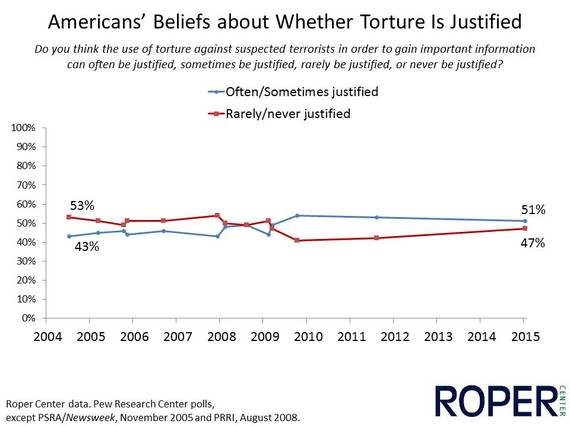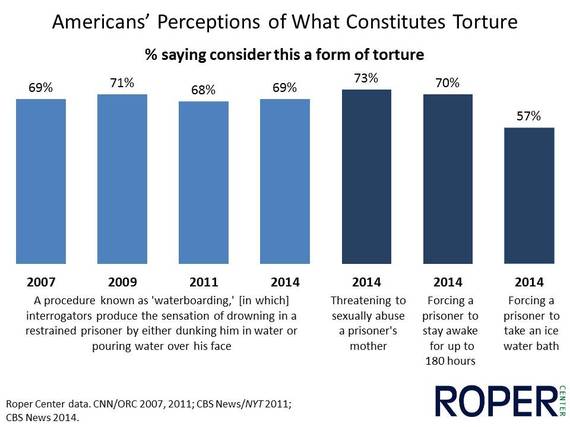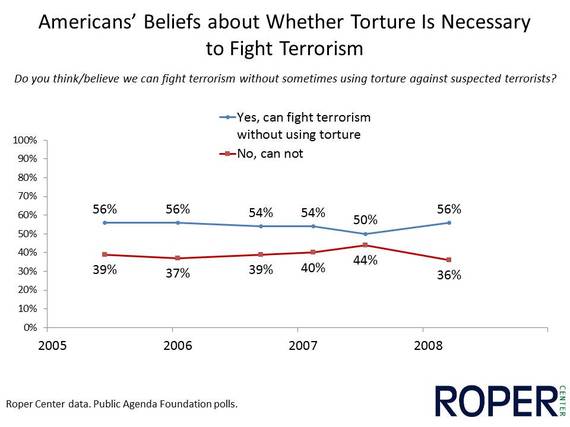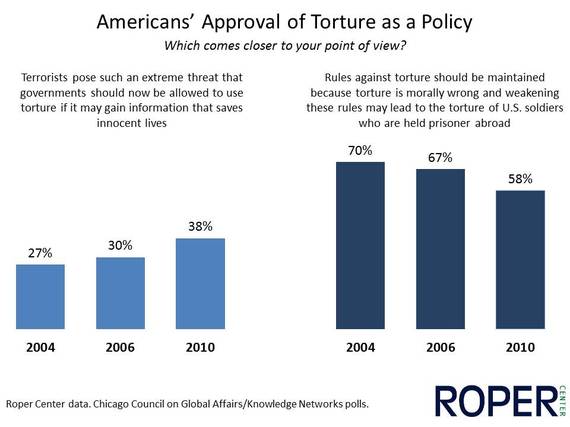
The release of the Senate Intelligence Committee report on the CIA use of torture in interrogations of suspected terrorists has renewed the debate over what the U.S. should or should not do to its prisoners in the war on terror. Where does the public stand -- and have their views changed over time? From the Roper Center for Public Opinion Archives:
Public attitudes about torture before September 11th
Very few questions about the use of torture were asked before September 11th. However, those that were asked reveal a public unlikely to be surprised by what was to come. Only 66 percent of Americans in a 1999 International Committee of the Red Cross/Greenberg Associates poll had heard of the Geneva Conventions. When these treaties were described, just 38 percent of all respondents said they thought the Geneva Conventions prevented war from getting worse, while 57 percent said they made no real difference. Moreover, 49 percent in a 1999 Taylor Nelson Sofres Intersearch poll said they thought that there were documented uses of institutionalized torture by police or government in the U.S., and only 44 percent believed that the right to be free from subjection to torture was fully respected in the United States.
Attitudes immediately following 9/11
A poll taken by Gallup/CNN/USA Today in October 2001, when the shock of the attacks was still new, found that 45 percent were willing to have the government torture known terrorists if they knew details about future terrorist attacks in the US; 53 percent were not. However, most did not like the idea of associating with other groups that used torture. Only 26 percent in the same poll were willing to have the government, in their efforts to fight terrorism, provide aid and assistance to organizations suspected of torture or other criminal acts.
What is torture and is it ever justified?
After the Abu Ghraib pictures were shown on 60 Minutes in April of 2004, an ABC News/Washington Post found that just 29 percent of Americans considered what American soldiers did to prisoners there to be torture, while 60 percent said it was abuse, but not torture. However, just over half (51 percent) in the same poll said they believed that the U.S. was indeed, using torture in war against terror as a matter of policy. At that time, when asked to choose between two statements about torture which came closer to their view, just 18 percent in an NBC/Wall Street Journal poll said it was "justified and understandable because we are at war against terrorists," while 72 percent said it was "always wrong, even in the case of war against terrorists."
In a Pew poll of July 2004, 43 percent of Americans said that torture of suspected terrorists to gain important information is often or sometimes justified. Since then, the proportion of saying often or sometimes justified has moved from a substantial minority to a slight majority.
Currently, a plurality of 49 percent in a December 2014 ABC News/Washington Post poll say that the CIA's treatment of suspected terrorists amounted to torture, while 38 percent said no. However, when asked about the specific actions that the CIA took, according to the Senate report, majorities do see them as torture. Widespread debate over whether waterboarding represented torture or not did not shift public views; the proportion that thinks so has stayed consistent since 2007.
Central to the American public's understanding of the torture debate is their belief that torture provides important information about terrorist activities. Though the recent Senate Torture Report called into question the efficacy of torture in garnering useful intelligence, 53 percent of the public in the December ABC News/Washington Post poll believed that the CIA's treatment of suspected terrorists produce important information that could not have been obtained by other means. Eighty-five percent of those who believed these methods produced important information said the CIA's actions were justified; only 28 percent said so among those who did not believe important information was produced.
Despite the majority belief that torture supplies important information, a small but consistent majority from 2005 to 2008 said that we can fight terrorism without using torture. Some Americans, therefore, may believe that torture can be effective, but other approaches equally or more so.
Should torture be policy?
A 2006 PIPA poll asking about restrictions placed on the U.S. by the treaties it had signed found 75 percent approved of having a rule against torture, while 21 percent said such a rule was too restrictive. A 2004 Chicago Council on Global Affairs poll found that, when asked which of two statements about the use of torture more accurately represented their view, 27 percent chose the one in support of allowing governments to use torture, while 70 percent supporting maintaining rules against torture. By 2010, support of using torture had increased, indicating a change in attitudes similar to the public's increased perception that torture can be justified. However, opposition to torture as a policy was still the majority position in 2010, while by that point majorities were saying that torture was sometimes or often justified. Some portion of the public may see torture as acceptable in certain circumstances, but not be willing to codify those circumstances into law.




